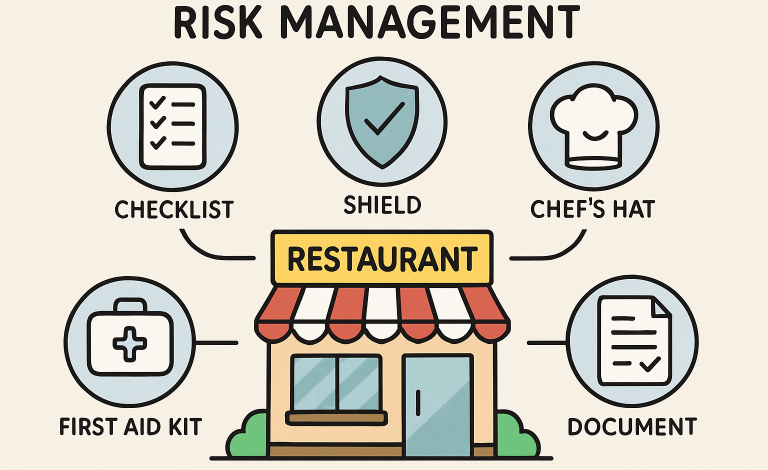Essential Strategies for Restaurant Risk Management

Key Takeaways
- Routine health and safety inspections help avoid costly violations and protect guests and staff.
- Regular equipment checks prevent disruptions and extend the longevity of appliances.
- Thorough training creates a safer workplace and enhances operational efficiency.
- Accurate and up-to-date permits are crucial for legal compliance.
- Clear communication about allergens increases customer confidence and reduces litigation risk.
- Diverse insurance coverage shields your business from a range of threats.
Table of Contents
- Introduction
- Perform Regular Health and Safety Checks
- Schedule Routine Equipment Maintenance
- Train Employees on Workplace Safety Procedures
- Ensure Proper Licensing and Permits
- Disclose Food Allergens and Nutritional Information
- Obtain Comprehensive Insurance Coverage
Running a restaurant comes with its fair share of challenges, from upholding health standards to safeguarding finances and customer data. In an industry where a single misstep can lead to reputational or financial harm, implementing strong risk management strategies is not just optional but imperative. Every restaurant owner, whether running a small café or a busy full-service bistro, benefits from developing a robust approach to risk mitigation. Effective risk management protects your investment, secures your staff, and ensures that your customers experience a safe and welcoming environment. For restaurant owners seeking to ensure the longevity and security of their establishments, consulting experts on restaurant insurance Colorado is crucial for specialized solutions and guidance in culinary risk management. By implementing clear processes, conducting regular reviews, and maintaining transparent policies, restaurants can confidently navigate daily uncertainties in a competitive landscape characterized by evolving regulations, changing insurance needs, and heightened customer expectations regarding food safety. A robust risk management plan, which includes health protocol reviews and staff training, addresses vulnerabilities proactively, enhancing compliance, brand trust, and customer loyalty. Additionally, leveraging technology and third-party resources fosters prevention over reaction, ensuring competitiveness in a market demanding greater transparency about food ingredients.
Perform Regular Health and Safety Checks
Strict adherence to local health and safety codes is foundational for any kitchen or dining room. Routine inspections of food storage, cleanliness, and staff hygiene help identify potential violations early, reducing the likelihood of fines or public health incidents. Businesses like Marley Spoon utilize food safety software for constant monitoring, but smaller operations can also benefit from checklists and periodic third-party audits. Review Time Magazine’s coverage on food safety for insights on industry standards and consumer expectations.
Schedule Routine Equipment Maintenance
Kitchen equipment is the backbone of restaurant operations. Regular maintenance and inspections not only address minor issues before they escalate but also improve energy efficiency and prolong the lifespan of expensive appliances. Critical items, such as refrigeration systems, grills, and dishwashers, require scheduled servicing to ensure uninterrupted operation. Establishing a preventive maintenance plan and retaining records helps reduce emergency repair costs and ensures compliance in the event of health department reviews.
Train Employees on Workplace Safety Procedures
A well-trained staff protects your investment in multiple ways. Regular safety workshops and operational training reduce accidents and create a shared sense of responsibility. Employees should be instructed on safe lifting techniques, proper handling of kitchen equipment, fire prevention, and recognizing hazards such as spills, hot surfaces, and gas leaks. Training should also include a straightforward process for reporting and addressing risks, such as a protocol for handling workplace injuries, which is critical for maintaining both safety and legal compliance. According to the Occupational Safety and Health Administration (OSHA), investing in ongoing staff development reduces risks, increases retention, and fosters a safety-first culture.
Read also: Strengthening Digital Growth with Advanced Marketing Techniques
Ensure Proper Licensing and Permits
All restaurants must comply with local regulations, which require securing and renewing the appropriate licenses—from food handling and liquor licenses to zoning approvals and health certifications. Lapses can result in fines, damage to a business’s reputation, and even forced closures. Operators should track expiration dates and legislative updates, and maintain a compliance calendar to ensure they do not miss renewal deadlines. Proactively managing these requirements helps businesses respond to regulatory changes without last-minute surprises.
Disclose Food Allergens and Nutritional Information
An increasing number of diners face food allergies and dietary restrictions. By clearly labeling menu items and disclosing all potential allergens—such as nuts and gluten—restaurants protect vulnerable customers and themselves from costly legal consequences. Nutritional transparency, including calorie counts and ingredient lists, not only builds customer trust but also ensures compliance with changing food labeling laws. Disclosing food allergens reduces incidents in food service settings and enhances guest confidence.
Obtain Comprehensive Insurance Coverage
Restaurants face multiple forms of risk, including accidental injuries, property damage, data breaches, and natural disasters. Comprehensive insurance coverage is a powerful line of defense, providing protection against general liability, workers’ compensation, property loss, and cyber liability for digital threats. Security measures, such as surveillance cameras, not only protect assets but also provide necessary documentation in the event of an incident. Owners are advised to regularly review insurance policies to address emerging risks and ensure adequate coverage as the business grows and regulations change.
Conclusion
Running a successful restaurant requires more than just great food—it demands foresight, compliance, and a commitment to safety. By conducting regular health checks, maintaining equipment, training staff, securing necessary permits, disclosing allergen information, and obtaining comprehensive insurance, owners can shield their businesses from costly setbacks while building trust with their guests. Risk management isn’t just about preventing problems; it’s about creating a resilient, customer-focused operation that thrives in a competitive industry. With proactive strategies in place, restaurant owners can protect their investment today and ensure long-term success for the future.




